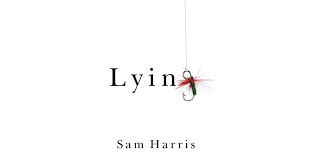Lying by Sam Harris | Issue 110 | Philosophy Now
Curated from: philosophynow.org
Ideas, facts & insights covering these topics:
6 ideas
·1.3K reads
2
Explore the World's Best Ideas
Join today and uncover 100+ curated journeys from 50+ topics. Unlock access to our mobile app with extensive features.
The central thesis of Sam Harris's book, Lying (2013)
You should not lie.
Harris implies throughout his essay that truth and honesty should prevail in all instances of human interaction,including those who employ ‘white lies’ to protect people from uncomfortable realities and unnecessary harm.
54
342 reads
The consequence of lying
To lie is to sacrifice your integrity, and to place the possibility of deep and meaningful bonds with fellow humans at risk.
60
243 reads
Two types of lies
- Lies of commission. The liar is active in his or her attempt to deceive.
Example: A job applicant falsifying his credentials in an effort to land a desired position.
- Lies of omission. This is a passive act, involving a person’s failure to do something.
Example: A job applicant is neglecting to list on his resume the job from which he was fired.
53
189 reads
Skillful Truth-Avoiding
Skillful truth-avoiding is the evasive tactic of withholding one’s actual feelings by instead inserting a less relevant, albeit true, statement, and is far from being honest.
It is essentially to replace a lie of commission with a lie of omission.
Although Harris rails against active lies in this book, he fails to acknowledge that ‘skillful truth-telling’ is nothing more than lying by another name.
50
184 reads
A Brutal Liberation
The truth-teller is a kind of liberator, rescuing the deluded individual from his protective fantasies.
Those who employ white lies in an effort to benefit others are demonstrating the “quintessence of arrogance” since in such cases the liar assumes he knows what truths can be handled by the other person.
Harris assumes that the beneficiary of these truth statements is themselves blind to reality.
51
163 reads
The Truth About Honesty
Sam Harris’s major, and dubious, assumption, is that complete honesty is possible.
The concept of unconscious motives or maladaptive psychological underpinnings that we can know nothing about, or of ‘bad faith’ (a form of self-deceit), are not considered in Harris’s analysis.
Since we are then all liars by nature, the best course of action is only to lie in ways that are intended to promote another’s well being.
47
185 reads
IDEAS CURATED BY
Alfie Easton's ideas are part of this journey:
Learn more about personaldevelopment with this collection
How to practice effectively
The importance of consistency
How to immerse yourself in the language
Related collections
Similar ideas
1 idea
Eight Types of Lies that People Tell
thehopeline.com
26 ideas
23 Psychology Facts about Lying (2022) Most People Don't Know I Interesting Facts
newinterestingfacts.com
2 ideas
The psychological reasons why some people can't stop lying
businessinsider.com
Read & Learn
20x Faster
without
deepstash
with
deepstash
with
deepstash
Personalized microlearning
—
100+ Learning Journeys
—
Access to 200,000+ ideas
—
Access to the mobile app
—
Unlimited idea saving
—
—
Unlimited history
—
—
Unlimited listening to ideas
—
—
Downloading & offline access
—
—
Supercharge your mind with one idea per day
Enter your email and spend 1 minute every day to learn something new.
I agree to receive email updates



